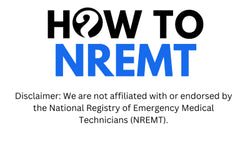Preparing for the NREMT exam is no easy feat. Many candidates devote weeks or even months to studying but still find themselves struggling when it’s time to sit for the test. This often happens because of some common pitfalls that can impede your progress. Whether you’re preparing for the EMT or Paramedic exam, being aware of these mistakes can help you avoid unnecessary stress and boost your chances of passing.
Here, we’ll walk you through the most common NREMT preparation pitfalls and offer practical strategies to sidestep them, so you can maximize your NREMT test prep.
1. Cramming at the Last Minute
One of the biggest mistakes candidates make is cramming right before the exam. When it comes to NREMT exam prep, consistency is key. Cramming can lead to burnout and stress, which will negatively impact your performance.
Why it’s a problem:
Last-minute studying only helps you retain information temporarily. It’s less likely that you’ll remember the material long-term, and it doesn’t give your brain the time it needs to process the information effectively. Plus, the stress of trying to absorb so much in such a short time can make it harder to focus and retain information.
How to avoid it:
Instead of cramming, make a study schedule that spreads your preparation over several weeks or months. Break your study sessions into manageable chunks and give yourself plenty of time to review, practice, and reinforce what you’ve learned.
2. Overemphasis on Hands-On Skills
Another common NREMT preparation pitfall is focusing too much on practical skills. As of July 2024, the NREMT no longer tests hands-on skills as part of the exam.
Why it’s a problem:
Many candidates may mistakenly prioritize hands-on training, believing these physical tasks will play a significant role in their exam performance. While practical skills are essential for real-world EMT and paramedic work, they are no longer directly assessed in the exam. Focusing too much on hands-on practice can leave you underprepared in the areas that the NREMT is currently emphasizing—namely, theoretical knowledge, patient assessment, and critical thinking.
How to avoid it:
Ensure your NREMT exam prep focuses on the current exam structure. Instead of spending excess time on physical procedures, concentrate on mastering the theoretical aspects of emergency medical care, including understanding protocols, patient assessment, and critical decision-making. Make sure that you’re practicing clinical reasoning, memorizing essential medical concepts, and applying your knowledge in various scenarios.

3. Underestimating the Importance of Practice Exams
Some candidates underestimate the value of practice exams and fail to incorporate them into their study plans. Practice tests simulate the real exam environment and provide a great way to gauge your preparedness.
Why it’s a problem:
Without regularly taking practice exams, you may not be aware of the areas where you need to improve. Practice exams also help you get used to the time constraints and question formats you’ll face on test day. Without this preparation, you may feel unprepared or overwhelmed during the actual exam.
How to avoid it:
Make sure to take several practice exams throughout your NREMT exam prep. Focus on the areas where you’re weakest, and work on improving your weak spots. Use practice exams to assess your readiness and boost your confidence.
4. Relying Solely on One Source of Study Material
Relying solely on a single study guide or one set of materials can limit your understanding of the material. It’s important to use a variety of resources to cover all aspects of the NREMT exam.
Why it’s a problem:
One study guide might not cover every topic or could have gaps in the information. By sticking to only one source, you risk missing important details that may appear on the exam. Also, relying too heavily on one resource can give you a narrow view of the content.
How to avoid it:
Use a mix of resources, including textbooks, online practice questions, video tutorials, and study guides. Make sure to vary your study tools and approach so that you get a well-rounded understanding of the material. Diversifying your materials will also keep your studying fresh and engaging.

5. Not Managing Time Effectively
Time management is one of the most critical aspects of NREMT exam prep. Candidates who fail to manage their time efficiently can end up feeling rushed, unprepared, or unable to finish the exam on time.
Why it’s a problem:
Poor time management can result in incomplete study plans and the inability to cover all the necessary material. On exam day, it can also lead to panicked decision-making and mistakes under pressure.
How to avoid it:
Create a study schedule that allocates specific times for reviewing topics, taking practice exams, and revising weak areas. Set realistic goals for each study session and stick to them. Additionally, on test day, make sure you’re familiar with the timing for each section of the exam so you don’t rush through questions.
6. Failing to Take Care of Your Mental and Physical Health
Many candidates focus so much on studying that they neglect their mental and physical health, which can affect their overall performance on the exam.
Why it’s a problem:
Stress, anxiety, and lack of rest can severely impact your cognitive function, making it harder to concentrate, retain information, or perform well on test day. Not taking care of your health can lead to burnout and may even affect your ability to focus during the exam.
How to avoid it:
During your NREMT exam prep, make sure to prioritize self-care. Get adequate sleep, maintain a healthy diet, and take regular breaks to rest and recharge. Incorporate relaxation techniques, such as meditation or deep breathing, to manage stress and boost your focus.
7. Skipping the Review Process
After studying a topic or completing practice exams, many candidates neglect to review the material thoroughly. This oversight can leave gaps in your knowledge and prevent you from fully mastering the content.
Why it’s a problem:
Not reviewing your mistakes or areas of weakness means that you’ll continue to make the same errors. Without reviewing the material, you also lose the opportunity to reinforce concepts in your memory.
How to avoid it:
After each study session or practice exam, take the time to go over the mistakes you made and understand why you got them wrong. Make sure to revisit any topics that were difficult for you and reinforce them by revisiting the content.

Don’t Let Common Pitfalls Stand In The Way Of Your Success!
At How to NREMT, we’re here to help you stay on track with personalized NREMT test prep . Our comprehensive resources include study guides, practice exams, and expert advice tailored to help you master every aspect of the NREMT exam. Whether you're preparing for your EMT or paramedic test, we offer the tools and support you need to boost your confidence and improve your performance.
Don’t wait until the last minute—start your NREMT exam prep with How to NREMT today!

